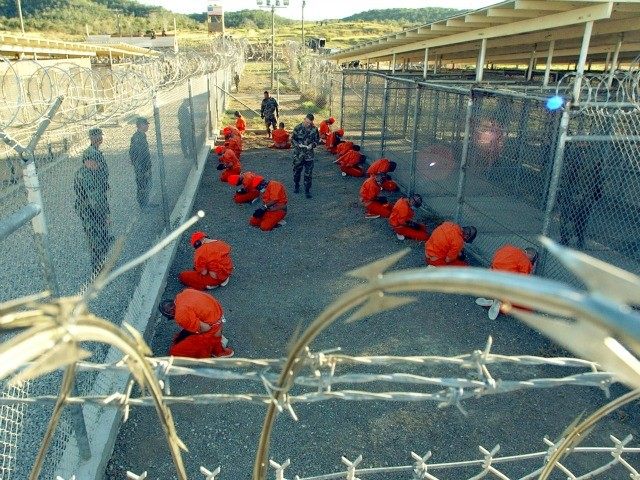Shawqi Awad Balzuhair, an al-Qaeda-linked terrorist from Yemen, has been transferred from the U.S. prison in Guantánamo Bay, Cuba, to the island nation of Cabo Verde off the coast of West Africa, where al-Qaeda is believed to have set up sleeper cells and is recruiting jihadists to train in Yemen.
Citing U.S. officials who spoke on condition of anonymity, The New York Times (NYT) reports that Defense Secretary Ash Carter has provided Congress a 30-day notice for the release of eight more detainees out of 20 who have already been approved to be liberated by President Barack Obama’s parole-style board, the multi-agency Periodic Review Board (PRB).
The recent transfer, announced by the Pentagon on Sunday, brings the total number of prisoners still held at Guantánamo Bay to 59.
According to a U.S. intelligence profile of Balzuhair, dated January 28, 2016, it is unclear whether he will reengage in terrorist activities upon his release.
The profile notes:
[Balzuhair] has provided little insight into his views of extremism or violence, hindering our understanding of whether he would pursue extremist activity after detention. He has not expressed or demonstrated any sympathy or support for [al-Qaeda], its global ideology, or other radical Islamic views, probably judging that this may improve his chances of release. Early in his detention, [Balzuhair] expressed hatred toward the US and said that he was being held unjustly.
Al-Qaeda may try to reach out to Balzuhair, 35, once he arrives in the former Portuguese colony of Cabo Verde, also known as Cape Verde.
Despite the low Muslim population of 2 percent, a daily newspaper in the island, A Semana, and Voice of America (VOA) reported in 2012 that the terrorist group is converting, radicalizing, and recruiting residents.
Balzuhair is the second detainee from the Guantánamo facility, also known as Gitmo, to be transferred to the island nation. In 2010, prior to reports about the presence of al-Qaeda operations in Cabo Verde, the former Portuguese colony took in a low-level Syrian jihadist, also linked to al-Qaeda.
However, Balzuhai, who had been held at the U.S. military prison since October 2002, may be an attractive target for the jihadist group given that it is reportedly recruiting potential fighters there to train in Yemen, where Balzuhair’s family resides.
In January 2012, A Semana reported that the CIA and its counterparts from various European countries “believe there to be Cape Verdeans both here [in the island nation] and abroad who have converted to Islam and are recruiting individuals for military training in Yemen, one of Al Qaeda’s main bases.”
“Cape Verde is believed to be among the African countries selected by Al Qaeda to install terrorist sleeper cells whose target is Europe,” added A Semana.
The global terrorist organization’s branch known to operate in and around Cabo Verde off the coast of West Africa is al-Qaeda in the Islamic Maghreb (AQIM).
According to the International News Safety Institute (INSI), an NGO dedicated to the safety of journalists working in hostile territories, the former Portugal colony to is mostly safe.
However, it notes:
In 2014 officials said regional terrorist groups, namely Boko Haram and al-Qaeda in the Islamic Maghreb (AQIM), had a presence in the archipelago but there have been no subsequent reports to suggest that a serious foothold has been established. The combination of a large tourist industry and small coast guard does make the country vulnerable to potential attacks in the future… Militants could also attempt to transit via Cabo Verde to Europe…
Boko Haram is a Nigerian-based jihadist group that has pledged allegiance to al-Qaeda rival the Islamic State (ISIS/ISIL).
The U.S. intelligence profile describes Balzuhair as “a low-level Yemeni militant who traveled to Afghanistan in mid-2001, received basic training at an [al-Qaeda] camp, and served on the frontlines before 9/11.”
On September 11, 2002, Pakistani authorities apprehended him in Karachi along with five other Yemeni terrorists. They all reportedly belonged to an al-Qaeda operational cell known as the “Karachi Six.”
“We judge that this label more accurately reflects the common circumstances of their arrest and that it is more likely the six Yemenis were elements of a large pool of Yemeni fighters that senior [al-Qaeda] planners considered potentially available to support future operations,” says the profile.
Obama’s multi-agency Gitmo board cleared the Yemeni terrorist for release on July 11, saying:
In making this determination, the Board considered that the detainee’s degree of involvement and significance in extremist activities has been reassessed to be that of a low-level fighter. The Board also noted the detainee’s lack of expression of support for extremist ideologies, the detainee’s compliance record at Guantanamo, and the detainee’s lack of ongoing extremist ties.
Of the 59 jihadists still held at the Guantánamo facility, 20 have been approved for release by President Barack Obama and 29 are deemed “forever prisoners,” or too dangerous to release.
The remaining 10 Gitmo detainees “are in war crimes proceedings at military commissions, six of them death-penalty tribunals,” according to the Miami Herald.

COMMENTS
Please let us know if you're having issues with commenting.